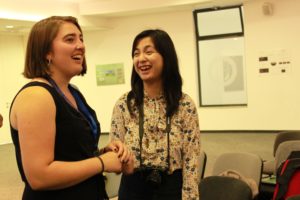by Sarah Fizer
In only the first two days of the Sarajevo Symposium I have found the most interesting observation to be the perception of post-conflict transitions among my classmates. We are an amazingly diverse group of individuals that transcend across generational, experience, cultural, and social divides.

As someone who is new to navigating the post-conflict transition world, and in the process of gaining experience and understanding, these first few days have been eye-opening. The ability to have people from all different walks of life come together to work towards solving some of the world’s most difficult problems is something I haven’t seen on the ground floor before this symposium. After getting the opportunity to listen to my colleagues and hear their impact on the communities they serve, I am even more confident this is the field where I want to devote my time.
Participants have had the ability to bring their own experiences and cultural viewpoints to problem solving the various scenarios we have been assigned to resolve in small group settings. As someone with less experience in the field, I have naturally taken on the role of an observer in many of these group processes and activities. Through this role I have been learning from my peers, of which has been a very rewarding experience. The sessions have provided opportunities to learn how post-conflict transitions are typically navigated through the processes of governance, security, justice, and reconciliation. Understanding these concepts through real discussion and modern-day case studies has been a great way to learn this content. My undergraduate coursework has given me some experience with advocating for reconciliation programs, through educating my colleagues on their importance and connecting people to resources. However, advocacy is much different than creating the programs from the ground up, and the reconciliation programs that I have experience with are for victims of more isolated accounts of conflict through individual experiences of gender discrimination or sexual assault. While this structure of navigating transitions is very common within known circles, I personally have found this to be new information and I look forward to critically thinking through this lense for the remainder of the symposium and through my future in the process of managing these transitions.

